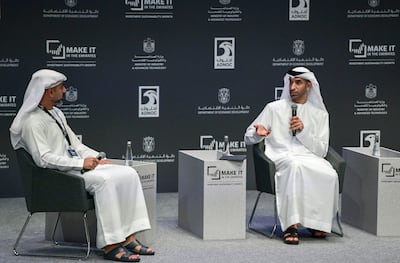The UAE and Turkey have ratified the Comprehensive Economic Partnership Agreement signed earlier this year, Minister of State for Foreign Trade, Dr Thani Al Zeyoudi, has confirmed.
“This deal marks a new era of co-operation in our long-standing friendship, and will help push bilateral non-oil trade beyond $40 billion in the next five years,” he said on Wednesday.
It is currently estimated at about $18.9 billion.
The agreement between the two countries was signed in March to boost bilateral trade.
The deal, expected to come into effect from the middle of this year, will create 25,000 highly skilled jobs in the UAE and 100,000 jobs in the Turkish market in the next 10 years, Dr Al Zeyoudi told The National in March.
“The focus is going to be on services, including AgriTech, construction, ICT, telecommunications, logistics and pharmaceuticals,” he said at the time.
The UAE, which aims to boost trade and economic relations with countries around the globe, is working towards signing 26 Cepa agreements as it seeks to attract more investment and diversify its economy.
The country has already signed similar deals with India, Israel and Indonesia, and is close to concluding agreements with Kenya.
In April, it finalised terms of a similar pact with Cambodia and recently finished negotiations for a new trade deal with Georgia.
The UAE also started talks for Cepa deals with Costa Rica as well as Thailand and Vietnam.
Last week, the UAE and Malaysia agreed to start Cepa negotiations.
UAE exporters can reach “more than 2.2 billion consumers today thanks to new trade agreements with some of the world’s fastest-growing economies”, Dr Al Zeyoudi said at the Make it in the Emirates forum in Abu Dhabi on Wednesday.
He added that Cepas could contribute to more than 2.6 per cent of national gross domestic product by 2031.
“Comprehensive economic partnership agreements with India, Israel, Indonesia and Turkey increased the number of people manufacturers could reach by 1.6 billion.
“This will grow further with the Emirates poised to sign a string of new deals this year,” he told delegates.
“We are going to conclude four to six agreements by the end of the year and that’s going to create huge opportunities for our manufacturers and factories,” Dr Al Zeyoudi said.

“We’re focusing on the countries that are expected to have huge growth and huge demand for the products we’re producing.”
He added that the UAE has provided “a wide range of incentives and enablers to attract foreign direct investments” and created an ecosystem that supports the establishment and expansion of businesses.
The UAE's foreign trade agenda is part of the nation’s growth strategy that seeks to double the size of the economy to $762 billion by 2030.
Last year, the UAE’s non-oil foreign trade surged 17 per cent annually to reach a record Dh2.23 trillion.
This was the first time the UAE’s non-oil foreign trade crossed the Dh2 trillion mark.
After growing by 7.6 per cent last year, the highest in 11 years, the UAE economy is expected to expand by 3.9 per cent this year and 4.3 per cent in 2024, the UAE Central Bank said in March.
Turkey's economy is forecast to have grown 3 per cent annually in the first quarter of 2023, despite the February earthquakes, according to Goldman Sachs.







